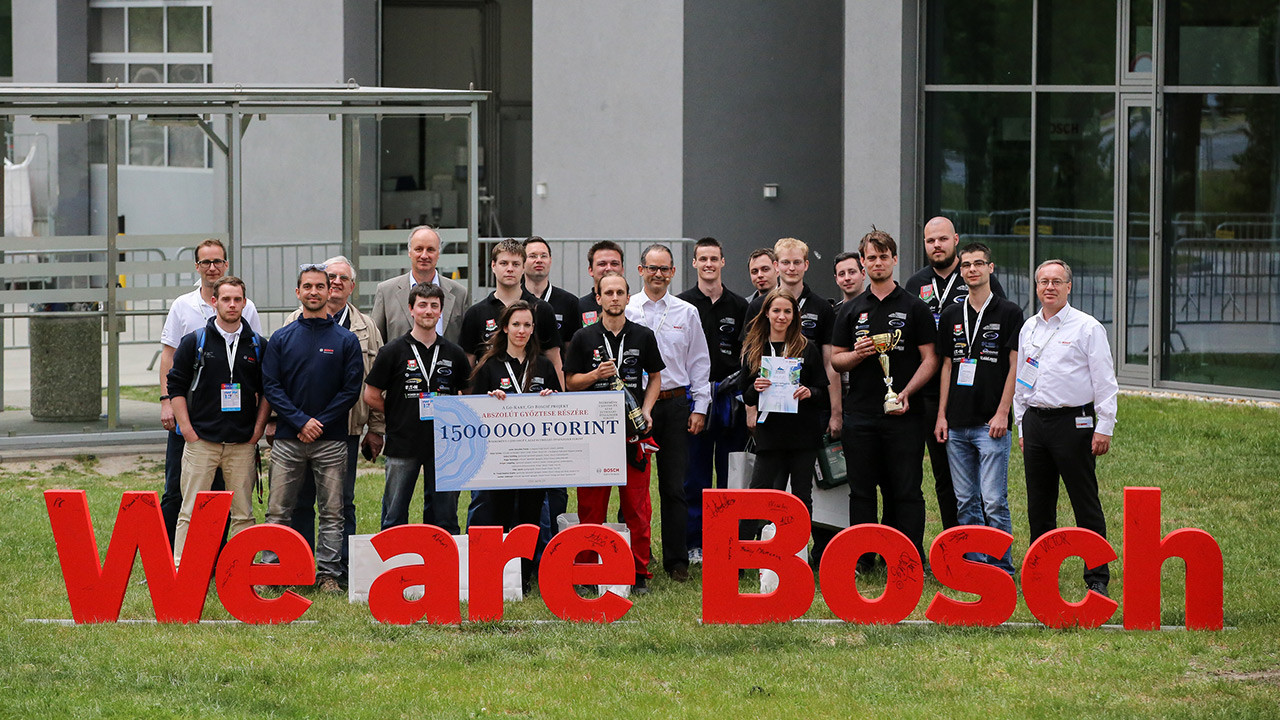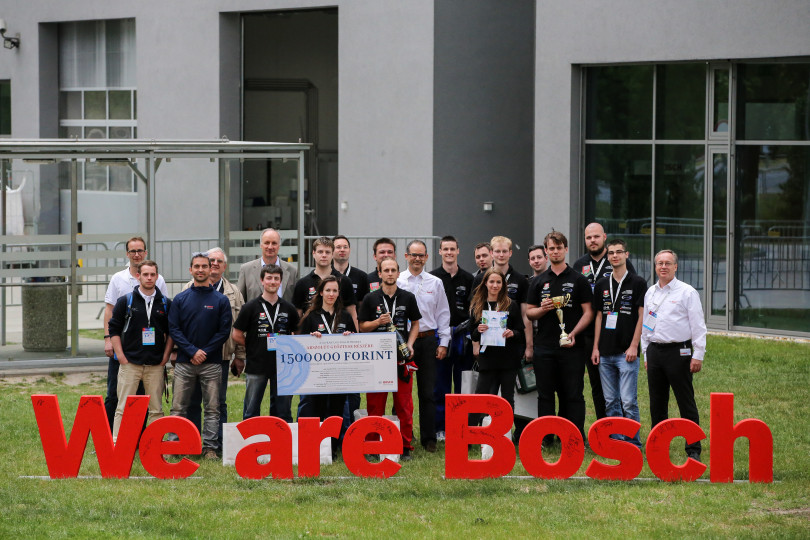Launched by Bosch three years ago, the Go-Kart, Go-Bosch! competition has had its final showdown. Ten teams from eight universities and colleges pitted the intelligent go-karts they had built using Bosch products and innovative technology. It was a complex task: the most talented students in Hungarian higher education were issued with brand new go-karts by Bosch and had to fit them up with the technology of the future incorporating sensors, cameras and radars. The students made autonomous – self-driving – vehicles, and had to make a starter out of an electric drill and a hybrid drive out a lawnmower. The parts and tools were all Bosch products, put to creative use by the teams.
The teams brought imagination and professionalism to the job of implementing the functionality of cars of the future in their go-karts. Bosch has attained its original aim with the series of events associated with the project: to demonstrate the importance of the engineering profession and practice-oriented training and show why it is good to be an engineer. Javier González Pareja, representative of the Bosch Group in Hungary, said that creativity, expertise, intelligence and courage had all come together at the final of the Go-Kart, Go-Bosch! competition, and everybody had won. “The students have experienced what it is like to think under pressure, what it is like to create and perform, and what it is like to work in a team. We have got to know a lot of people we would like to work with in future and a lot of ideas we can make good use of. Congratulations to the victors and congratulations to everyone who took part!”
The real race feel
Nobody should think that the competition was just a matter of engineering and technical performance. The public who came to the event got a taste of the future feats of technology, but they also experienced true racing excitement, in the form of acceleration contests, parking and navigation tests, and timed laps. Totalcar frontmen Róbert Winkler and Gábor Bazsó hosted the 23 April Bosch go-kart final, a festival-mood event that produced champions in three categories. The teams decided which categories they entered – all three, if they dared.
Efficient go-kart category
Manufacturers’ development teams have been pursuing alternative drives at high speed in recent years, with efficiency and long-term performance in view. In the Efficient category, teams had to build a go-kart powered by a hybrid drive and fit it with regenerative brakes and a rear differential. All ten teams entered in this category, and it was the Safety Kart team from Budapest that took the laurels. The teams won their points in the acceleration and rented go-kart contest.
Intelligent go-kart category
These are go-karts with the most advanced driver assistance systems, capable of automatic parking and proceeding along a learned route to park in a designated space. The students built in two further driver assistance systems: one convenience function – lane keeping – and one safety function – automatic emergency braking. By linking up these two systems, they implemented adaptive cruise control, a system that keeps the go-kart at a set speed while keeping the proper distance from the vehicle in front, and keeping in lane. All ten teams entered the intelligent go-kart category, which was won by the GAMFkart from Kecskemét. Scoring involved parallel and perpendicular parking, home parking, emergency braking, lane keeping and automatic distance keeping.
Autonomous go-kart category
It was the third category – building on the second – that realised the vision of autonomous transport. The go-karts had to do more than automatically navigate to a set destination. They had to be self-driving in certain traffic situations, using driver assistance systems based on their own sensors and external signals. Seven of the ten teams entered the autonomous go-kart category: GAMFkart, FORZA NYF KART, ME-KART, Safety Kart, Pannon-Racing, Sopianae Motorsport PTE and G.B.G. Team. In the end, it was the ME-KART team from Miskolc that came out on top. Scoring was based on light and sign recognition, ultrasonic navigation and GPS navigation.
Based on the combined results the absolute winner’s title went to ME-KART of Miskolc University, who thus kept the place they secured last year.
Mónika Hack
+36 70 510 5516
Bosch has been present in Hungary since 1899. After its re-establishment as a regional trading company in 1991, Bosch has grown into one of Hungary’s largest foreign industrial employers. In financial 2014, its 9 Hungarian subsidiaries had a total turnover of HUF 825 billion and sales of the Bosch Group on the Hungarian market – not counting trade among its own companies – was HUF 183 billion The Bosch Group in Hungary employs 10,500 people (as per April 1, 2015). In addition to its manufacturing, commercial and development business, Bosch has a network of sales and service operations that covers the entire country.
The Bosch Group is a leading global supplier of technology and services. It employs roughly 375,000 associates worldwide (as of December 31, 2015). According to preliminary figures, the company generated sales of more than 70 billion euros in 2015. Its operations are divided into four business sectors: Mobility Solutions, Industrial Technology, Consumer Goods, and Energy and Building Technology. The Bosch Group comprises Robert Bosch GmbH and its roughly 440 subsidiary and regional companies in some 60 countries. If its sales and service partners are included, then Bosch is represented in roughly 150 countries. This worldwide development, manufacturing, and sales network is the foundation for further growth. In 2015, Bosch applied for some 5,400 patents worldwide. The Bosch Group’s strategic objective is to deliver innovations for a connected life. Bosch improves quality of life worldwide with products and services that are innovative and spark enthusiasm. In short, Bosch creates technology that is “Invented for life.”
Additional information is available online at www.bosch.hu



